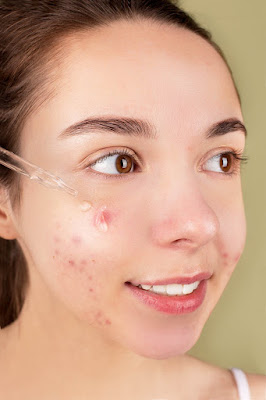What causes acne breakouts? If you suffer from acne, you’ve probably asked yourself this question many times. While there are many causes of acne, there is also a lot of misinformation out there about how breakouts occur and what you can do to treat them. Fortunately, this article will provide you with the most accurate and up-to-date information available to help you banish your acne once and for all.
What is acne?
Acne is one of the most common skin problems among teens and young adults. Although scientists are not sure what causes acne, I think it to be a combination of several factors.
Acne essentially starts when a pore in your skin becomes clogged. When this happens, whiteheads and blackheads can form. Whiteheads are the beginning of a pimple, and squeezing or picking at them can make the situation worse. In addition, using harsh and abrasive scrubs can also lead to new pimples forming.
There are also several types of acne. Some of these types range from mild to severe, and acne sufferers may have over one type. However, the causes of acne breakouts remain the same, no matter what type of acne you have. The acne is as follows.
1. Whiteheads
These are the beginnings of a pimple, but they stay under the skin and are not always visible. However, scratching these small spots can cause further irritation.
2. Blackheads
Blackheads appear when sebum gets trapped in a pore, clogging it.
3. Papules
These small pink bumps are a mild form of acne. Although they are not normally painful, tearing or picking at them can make the area more inflamed and spread bacteria to other parts of the face.
4. Pustules
These red, inflamed bumps are very visible on the skin and usually contain pus at the top. They can also be very painful.
5. Nobules
These large, solid, inflamed, and very painful pimples are deep in the skin. This is a more serious form of acne.
6. Cysts
Cysts are the most painful type of acne rash and cause pimples and acne scars.
While an occasional pimple happens to almost everyone, acne is a persistent, recurring condition where multiple pimples appear regularly on the face, back, neck and/or chest. It’s an unsightly and embarrassing skin condition, but there are several things that can contribute to acne. Knowing what can cause acne can also help you find the best treatment for acne breakouts.
Direct Causes of Acne
Although scientists don’t know for sure what causes acne breakouts, we have identified several direct causes of acne. One of the direct causes of acne is the overproduction of sebum.
Everyone’s skin is covered with an oily substance called sebum, which normally works in people with fair skin. However, when too much sebum is released and gets trapped in the pores, they become the ideal site for pimples.
While clogged pores can become inflamed and irritated easily, they can also form whiteheads or blackheads. A more serious form of acne, called acne vulgaris, can occur if the clogged pore becomes inflamed.
Overproductive sebaceous glands are one of the direct causes of acne, but there are also indirect causes of acne that need to be treated.
Indirect causes of acne
Besides the direct causes of acne, there are also indirect causes that can lead to acne breakouts. These can include:
1. Hormonal imbalances
We widely recognized that hormonal fluctuations and imbalances can contribute to acne. One of the best ways to deal with these hormonal fluctuations is to eat a diet rich in fiber and omega-3 fatty acids while reducing your sugar intake. Hormonal changes during pregnancy can also cause acne, even if you’ve never had it in the past. Fortunately, your acne clears up after you give birth.
2. Food Allergies
While it’s not clear why certain food allergies can trigger acne symptoms, we know that gluten, dairy, yeast and eggs can trigger flare-ups in people who are sensitive to these types of foods. If you think one of these foods trigger your acne, remove that food from your diet and see if symptoms improve.
3. Nutrient deficiencies
If you are deficient in the nutrients, your body needs to thrive, you will experience a variety of problems, including acne. If you have moderate-to-severe acne and are deficient in certain vitamins and minerals that your body needs, taking a supplement or increasing your intake of these vitamins through food can help relieve symptoms.
4. Poor diet
While the long-held belief that fatty foods and chocolate are a direct cause of acne has been dispelled, a poor diet can indirectly contribute to skin problems. If your diet is high in processed foods and saturated fats, you are not doing your skin any favors. By cutting out these highly processed foods and incorporating plenty of healthy fruits and vegetables, lean proteins and healthy fats, your skin condition is likely to improve dramatically.
5. Genetics
While it’s not clear what role genetics plays in the development of acne, many doctors are convinced that it can cause acne breakouts. If you have a family history of acne, doctors believe you are much more likely to get acne yourself.
If you suffer from acne, you have probably already searched the Internet for possible solutions to this stressful problem. Both on the Internet and on the market you can find various methods to get rid of acne and pimples, including potions and lotions. However, these types of products are expensive and do not guarantee 100% treatment of this skin condition.
Click https://deliverit.blogspot.com/p/acne-no-more.html for more details.
A simple solution to treat acne
Unfortunately, there is no single treatment for acne. Even though we know what causes acne breakouts, the treatments available work differently for everyone.
While you will probably have to try several remedies before it cured your skin, there are several ingredients that have been effective in treating and reducing acne. One of these ingredients, benzoyl peroxide, is effective in targeting the bacteria underneath the skin follicle. By killing the bacteria at its source, benzoyl peroxide reduces inflammation and improves the skin overall.
Salicylic acid, another ingredient commonly found in over-the-counter acne products, works similarly. This ingredient targets the layers of dirt and debris that have become trapped on the clogged skin follicle and removes them to reach the acne-causing bacteria and eradicate it.
These are two of the most effective over-the-counter ingredients for reducing and treating acne, but you’ll probably have to try several products before you find the one that’s right for you.
There are several direct and indirect causes of acne breakouts, but knowing what causes these breakouts and how to treat them effectively is the key to getting beautiful skin. However, with all the misinformation out there, it's difficult to find the right treatment options for your acne. Fortunately, these tips and tricks should help you get the unblemished skin you’ve always wanted.





